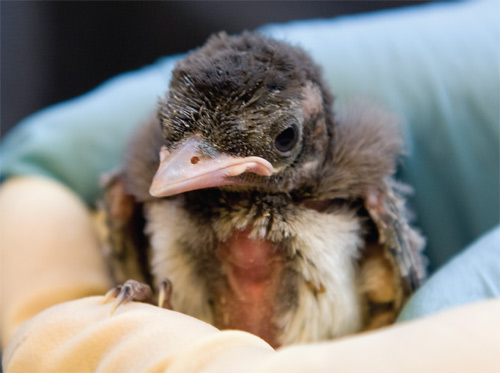Last summer, SPCA for Monterey County’s Wildlife Rescue and Rehabilitation Center supervisor Rosanna Leighton crawled down a ladder into a dark, narrow well. A coyote had been trapped 20 feet below for days, and claw marks at the surface suggested the coyote’s mate had unsuccessfully attempted to dig her out. As a colleague lowered a long pole into the well, Leighton worked an attached mammal net under the animal.
Together, the rescuers slowly pulled the coyote to the surface. A field exam showed her to be dehydrated but otherwise fine, and she was released.
“It was one of those cool moments: When the coyote got about 500 yards away, she stopped and turned around and looked back at us. Then, she ran off,” Leighton says. “That was by far one of the most amazing rescues I’ve been on.”
SPCA Wildlife Center staff and volunteers rescue approximately 2,500 animals annually in Monterey County. Operating under permits from the California Department of Fish and Game and the U.S. Fish and Wildlife Service, the center serves injured and orphaned animals and exotic pets that owners can no longer care for.
Most assistance goes to birds—everything from hummingbirds to parrots to golden eagles—but staff members also care for raccoons, deer, squirrels, horses, opossums, rabbits and more. “So many people, when they think of the SPCA, think of cats and dogs. That’s wonderful and that is a huge part of our mission. But, they don’t realize that if they have a raccoon in their attic, if they see a baby bird fall out of a nest, if they hit a deer at midnight and need help, we’ll be there,” says Beth Brookhouser, SPCA for Monterey County’s director of community outreach.
This year, the Wildlife Center established its new Humane Wildlife Services program. Staffers inspect properties, remove animals and provide action plans to prevent future invasions. Initial inspections cost about $65 to $100, depending on the location of the call; per-service fees apply for additional assistance.
“We’re able to get these animals out without causing them stress, injury or harm, and we stop them from getting back in,” says Leighton, explaining that some animal control services euthanize animals or separate babies and mothers in the removal process. “We’re more trying to convince them that there is a better place to live.”
When she hung a squirrel feeder outside her Pebble Beach home, Lucy Willman never suspected that animals would try to come inside. But, once they discovered a broken screen, squirrels let themselves into an air space above the bedrooms. A Humane Wildlife Services representative inspected the home and devised a plan to remove the squirrels: ammonia-soaked rags and loud music played from a stereo set on a ladder near the air space opening.
“The only thing I had that I thought would be good and loud was Edith Piaf, so they listened to ‘LaVie en Rose’ at full blast. I wasn’t going to play loud rock music, because I don’t like that either,” Willman laughs.
The method worked. Once the squirrels left, the Humane Wildlife Services project manager fixed several screens around the house to keep animals out for good. Willman now sees squirrels and their babies hopping around in her garden, right where they should be.
“It was just such a relief emotionally because, being an animal lover, it was really important to me to take care of this situation without hurting the animals in any way,” she says. “It was also a valuable lesson to be more careful about preventive measures around my home.” Property owners can prevent some problems, Leighton says, by not feeding wildlife. Giving animals food discourages them from supporting themselves, and it can cause populations to grow beyond what local environments can support. It also is important to secure trash can lids and take dog and cat food inside at night.
“Animals are opportunistic,” she explains. “If something is easy to eat, they’re going to come back for it.” Leighton encourages people to call the SPCA Wildlife Center whenever they have questions about an animal’s behavior. “If people are concerned about something that’s going on, or they’re not quite sure if it’s an animal’s normal behavior, we’re always available to see if it needs an intervention,” she says.
“We’d rather have somebody call us and have it be nothing than to have an animal suffer.”
Wildlife Rescue and Rehabilitation Center staff members are on call 24 hours a day. Call 831/373-2631, ext. 227, during weekday business hours or 831/646-5534 for after-hours emergencies. For information and appointments with Humane Wildlife Services program staff, call 831/373-2631, ext. 298. SPCA for Monterey County is an independent agency not supported by a national parent organization or outside funding. To volunteer or make a financial donation, visit www.spcamc.org.
